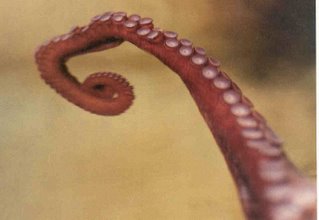
















"The octopus his big-hooded eye followed me, a single five-foot-long arm reached out, the incredible arm inched up past my wrist, it's suckers like cold kisses tasted my flesh with tens of thousands of chemoreceptors. I couldn't help feeling as if I were being studied, that a measured intellignece lay behind that intent eye and exploring arm." (1)
The octopus is a big-brained invertebrate - cognitive, behavioral, and affective. These are mollusks - but what creatures. Psycholgist Jenifer Mather studied an octopus vulgaris snatch some crabs, drag them back to a crevasse, cover the entrance with rocks, eat the crabs, and takes a siesta. They solve mazes, learn, remember. The brain wraps about the espophagus. They only spend 7% of their time hunting, and the rest of the time is engaged in recreation and communicating with others of their species. (2)
(1) slightly enhanced from a portion of "Through the Eye of the Octopus", Eric Scigliano, Discover, 2003, pp. 47 ff. (2) condensed from same article.
